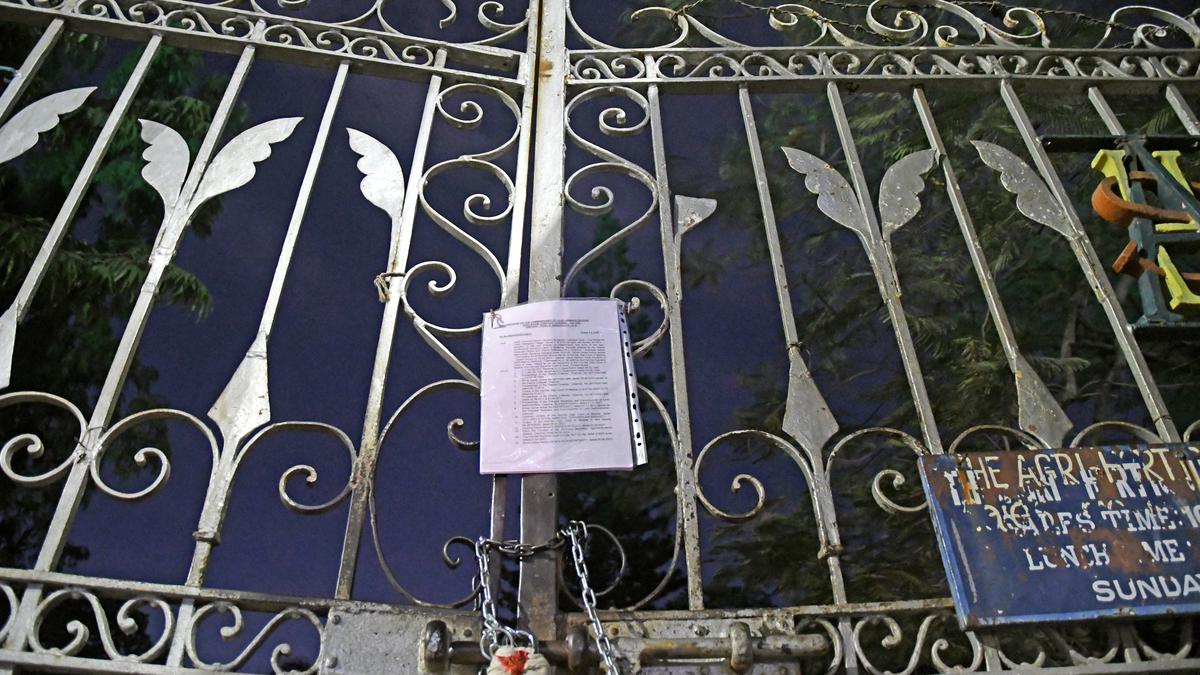
Madras High Court dismisses writ petition filed by Agri-Horticultural Society claiming title over property on Chennai’s Cathedral Road
The Hindu
The Madras High Court on Tuesday dismissed a writ petition filed by the Agri-Horticultural Society claiming title over four cawnies (each cawny measures 1.322 acres approximately), 18 grounds and 1,683 square feet of land next to Semmozhi Poonga on Cathedral Road in Chennai. The property is believed to be worth over ₹500 crore.
The Madras High Court on Tuesday dismissed a writ petition filed by the Agri-Horticultural Society claiming title over four cawnies (each cawny measures 1.322 acres approximately), 18 grounds and 1,683 square feet of land next to Semmozhi Poonga on Cathedral Road in Chennai. The property is believed to be worth over ₹500 crore.
Justice S.M. Subramaniam refused to quash the Land Administration Commissioner’s June 5, 2023 order setting aside the Chennai Collector’s 2011 proceedings for grant of ‘patta’ to the society with respect to the lands in question by recognising them as private lands and not government property.
The judge agreed with Additional Advocate General J. Ravindran and senior counsel P. Wilson, for impleading petitioner Y. Bhuvanesh Kumar, that the society must prove its title, if any, by approaching the civil court concerned and not by invoking the writ jurisdiction of the High Court.
The judge also stated that all contentions raised by the society were negatived by the High Court as well as the Supreme Court in the first round of litigation initiated by it challenging the show-cause notice issued by the Land Administration Commissioner in 2011 for suo motu review of the Collector’s orders.
Then, the courts had taken note that a Collector (in-charge) had passed orders in favour of the petitioner society on August 28, 2011 without reference to the nature of documents verified by him and had come to a conclusion that the disputed property was private and not government.
“This court also made an observation that the very urgency shown in passing the said order, within a period of five months that too by the In-charge Collector clearly indicates that someone is behind in getting undue advantage for the petitioner society. Therefore, the petitioner has no legs to stand,” Justice Subramaniam wrote. He further stated the allegations of mala fide intention and political bias behind the present government wanting to take away the property from the petitioner society too, were raised in the earlier round of litigation before the High Court and they were consistently negated by the court.
“As far as the impugned (under challenge) order is concerned, the Commissioner of Land Administration categorically considered the grounds raised by the petitioner and made a finding in unambiguous terms... The petitioner society has been in possession of the government land for several decades and therefore it is liable to pay minimum lease rent,” he held.

“Writing, in general, is a very solitary process,” says Yauvanika Chopra, Associate Director at The New India Foundation (NIF), which, earlier this year, announced the 12th edition of its NIF Book Fellowships for research and scholarship about Indian history after Independence. While authors, in general, are built for it, it can still get very lonely, says Chopra, pointing out that the fellowship’s community support is as valuable as the monetary benefits it offers. “There is a solid community of NIF fellows, trustees, language experts, jury members, all of whom are incredibly competent,” she says. “They really help make authors feel supported from manuscript to publication, so you never feel like you’re struggling through isolation.”

Several principals of government and private schools in Delhi on Tuesday said the Directorate of Education (DoE) circular from a day earlier, directing schools to conduct classes in ‘hybrid’ mode, had caused confusion regarding day-to-day operations as they did not know how many students would return to school from Wednesday and how would teachers instruct in two modes — online and in person — at once. The DoE circular on Monday had also stated that the option to “exercise online mode of education, wherever available, shall vest with the students and their guardians”. Several schoolteachers also expressed confusion regarding the DoE order. A government schoolteacher said he was unsure of how to cope with the resumption of physical classes, given that the order directing government offices to ensure that 50% of the employees work from home is still in place. On Monday, the Commission for Air Quality Management in the National Capital Region and Adjoining Areas (CAQM) had, on the orders of the Supreme Court, directed schools in Delhi-NCR to shift classes to the hybrid mode, following which the DoE had issued the circular. The court had urged the Centre’s pollution watchdog to consider restarting physical classes due to many students missing out on the mid-day meals and lacking the necessary means to attend classes online. The CAQM had, on November 20, asked schools in Delhi-NCR to shift to the online mode of teaching.









